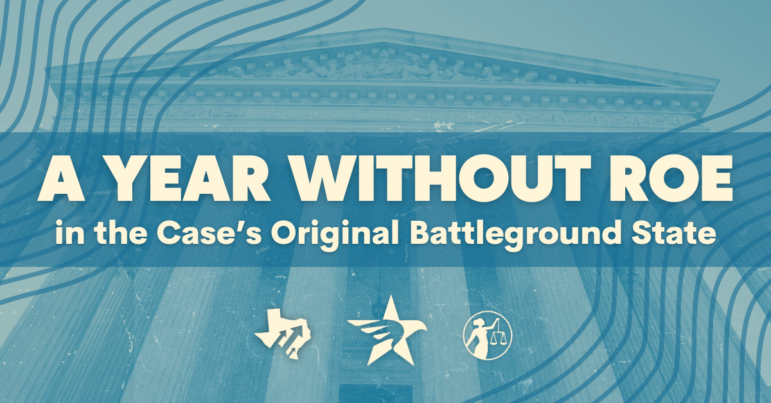June 24 marks a year since anti-abortion extremists who control our nation’s highest Court overturned Roe v. Wade with their ruling in Dobbs v. Jackson Women’s Health Organization — giving individual states the power to regulate abortion laws and our freedom over our own bodies.
The once hopeful — now fateful — story of Roe v. Wade’s journey to becoming the law of the land began here in Texas when the state denied Norma McCorvey an abortion. It was 1969. Sarah Weddington and Linda Coffee, two Texas lawyers, had been waiting for a case that could challenge the draconian laws banning abortion in 44 states. In 1970, they filed a suit against Henry Wade, the current District Attorney in Dallas County.
The case made it to the Supreme Court, and three years later, in 1973, abortion became a protected right in all 50 states — though the reality remained that people of color, young people, and underpaid people were still left to traverse barriers to access with few resources.
An onslaught of abortion restrictions would follow the landmark decision, and the religious right and anti-abortion extremists slowly chipped away at our hard-won rights with a decades-long strategy of gerrymandering, stigmatization, and court packing.
Almost half a century later — we’re mourning a Supreme Court ruling instead of celebrating. But while Roe deserved to be protected, it was never enough. We were always meant to go beyond what we’d won in 1973.
In 2023, our only choice is to build something new — and in the past year, Texas Freedom Network and our two projects, Just Texas and Texas Rising, have continued to fight for reproductive justice and strengthen our movement for social justice within our respective constituencies and local communities.
Just Texas’ Work to Destigmatize Abortion and Change the Narrative in Faith Communities through Reproductive Freedom Congregations
Just Texas, a project of TFN, was created as a response to the far-right’s weaponization of religion to steal our freedoms — particularly through anti-abortion legislation and restrictions on our right to reproductive health.
The religious right does not represent all people of faith in Texas, and we knew there were progressive faith communities in our state who supported abortion — the narrative around religious and reproductive justice just wasn’t highlighting their voices.
So in 2016, the Just Texas team created the Reproductive Freedom Congregation designation — giving us the opportunity to educate our allied congregations on the need to speak openly about abortion and provide training on actively supporting reproductive freedom values.
The designation recognizes Texas congregations working to build power for reproductive justice, foster trust and respect for people who need abortions, and remove the stigma from reproductive health decisions.
Since creating the designation, 29 congregations throughout Texas have gone through the invaluable process of becoming Reproductive Freedom Congregations.
Roe’s fall has only made this work more vital, and in 2023, we’ve already added three new Reproductive Freedom Congregations to our Just Texas community.
How Texas Rising and Texas Freedom Network Used Grassroots Advocacy to Decriminalize Abortion in Local Communities
Texans watched Roe disappear in slow motion — especially since the passage of Senate Bill 8 during the 2021 legislative session, which decimated abortion access by criminalizing the procedure after six weeks. The legislature also passed a trigger ban outlawing abortion in the event of Roe’s fall. We knew that moment would soon come.
In the months after the Dobbs decision, TFN, alongside our youth organizing project, Texas Rising, mobilized communities and urged for the passage of a slate of pro-choice city resolutions across the state called the GRACE Act — which passed in cities across Texas, including Austin, San Antonio, Denton, and Dallas during their first city council votes.
Initially, El Paso’s city council failed to pass protections for abortion seekers. Then came the 2022 election. Texas Rising turned out the vote for pro-choice candidates, and those candidates won. In January 2023, the new El Paso city council passed the GRACE Act. Thanks to a hard-fought battle from the city’s advocates, with our Texas Rising staff and student leaders leading the charge, we showed once again that voting really does matter!
Read GRACE Act testimony from Texas Rising’s Ivonne Diaz
Read GRACE Act testimony from Texas Freedom Network’s Sabrina Bustillos
This is the power of elections — the power of us.
Simultaneously, we conducted vital research with our partners that confirmed the majority of Texans do not support abortion bans — with 60% of Texas voters proclaiming they support access to abortion.
We Know the Fight Is Far From Over
While the passage of the GRACE Act across cities in Texas and the confirmation that Texas voters do not support abortion bans have given us hope, our state’s leaders continued to ignore the will of the people this legislative session.
Their crusade to dominate our private health decisions raged on with the passage of HB 2127 — a sweeping “death star” bill that seeks to strip governing authority from our cities by forcing them to comply with a number of cruel Texas state laws, including wasting our taxpayer dollars and resources on prosecuting abortion-related crimes.
On the Dobbs decision anniversary, let us be abundantly clear: We will not be idle or silent while the state holds our bodies hostage.
We cannot be free without reproductive freedom.
Fighting for access to abortions intersects with racial justice, immigrants’ rights, trans rights, and so much more. Texans knew what it was like to have almost no access to abortion care before Roe fell, and we know what is at stake.
We are fighting for our families, communities, and futures. Anti-abortion lawmakers cannot take away our collective power. Together, we will create a reality full of more compassion, dignity, and freedom than we have ever known.


